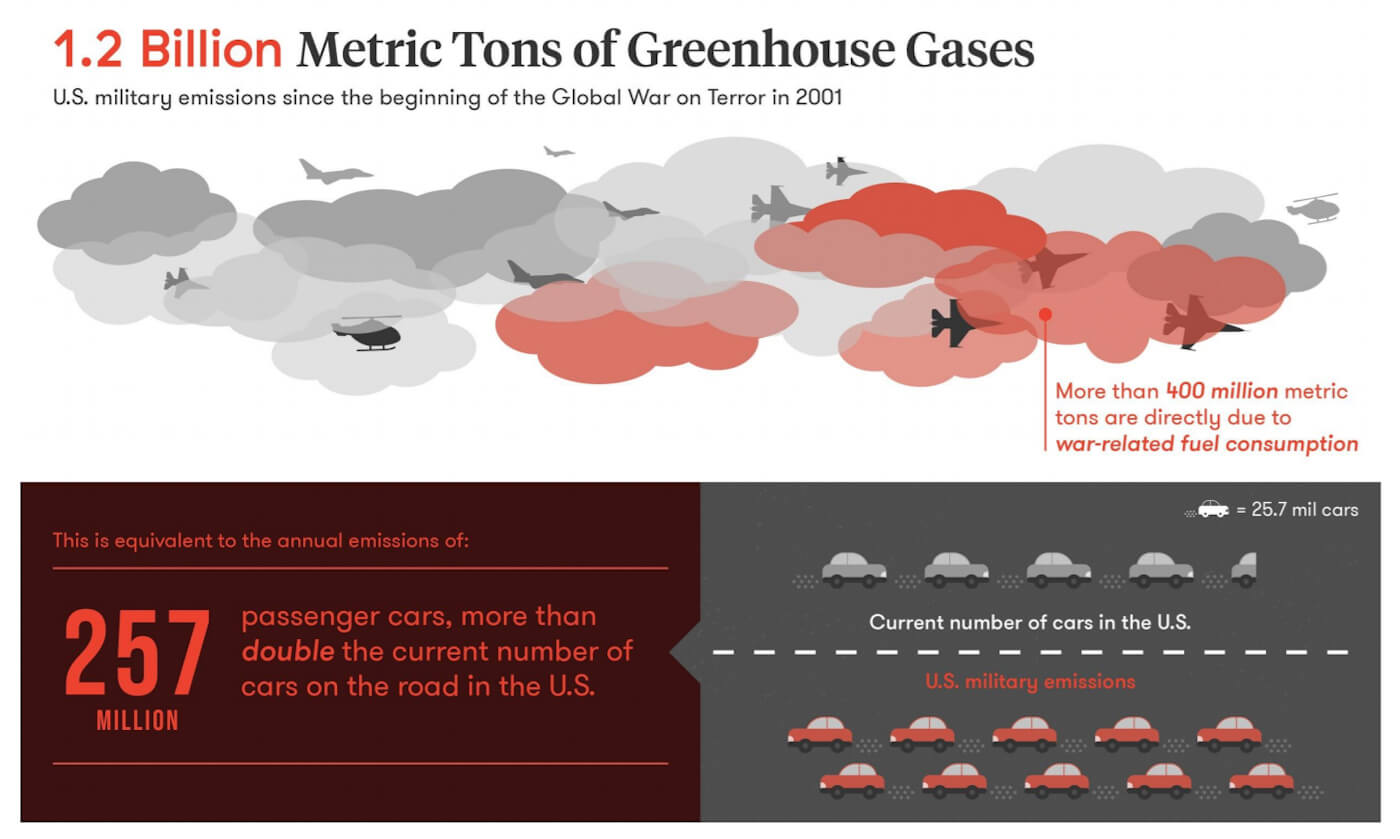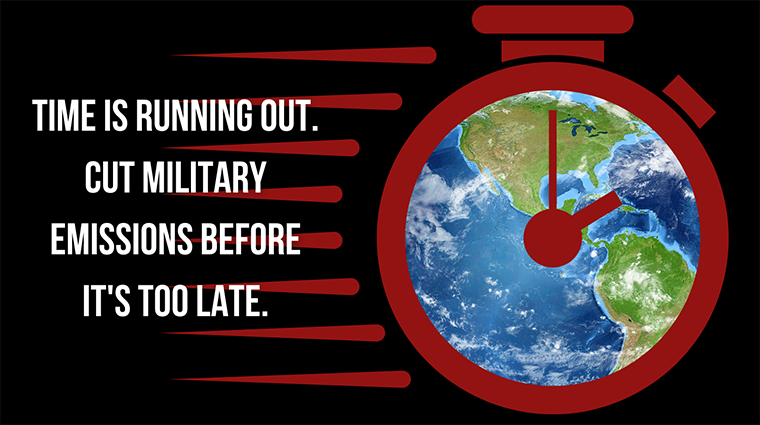
COP28 Military Emissions and Spending
Online Event Scheduled for December 8
Wendela de Vries / Stop Wapenhandel
DUBAI (November 23, 2023) — How does militarism escalate climate breakdown? What has antimilitarism got to do with climate justice?
From the exemption of military emissions from carbon-reduction targets, to military spending as a driver of emissions and diverter of climate finance. From intensifying military forms of greenwashing to organised violence used to enforce ecocide and police environmental defenders… The links are many and in dire need of addressing.
Join us online on December 8th for an hour of informal conversation with activists on the ground at COP28. Live from Dubai, they will tell us about their efforts to move military issues up the climate agenda, and to foreground demilitarisation as a strategy for climate justice.
Speakers will include Nesmah Mansoor Ali (Yemeni Peace Track Initiative and Womens International League for Peace and Freedom), Rula Asad, (feminist researcher, journalist, co-founder of the Syrian Female Journalists Network) and Deborah Burton (Tipping Point North South)
Some Insights into COP 28:
What Is Happening on the Ground?
Dec.8 2023 18.00 GST (Dubai) 09.00 EST (East Coast) 15.00 CET (EU)
ACTION: Register in advance for this meeting:
https://us06web.zoom.us/meeting/register/tZUrdO-hpz8vG9zA-avEqbTqEO4FbQGb5wVp.
After registering, you will receive a confirmation email containing information about joining the meeting.

Military Emissions and
Spending Events at COP 28 in Dubai
Dec.2, 2023 11:30 — 13:00 International Climate Dialogue Pavilion
“War, Carbon and Infrastructure: Conflict and the Military Emissions Gap” In collaboration with Perspectives Climate Group, Germany, and the Taiwan Climate Partnership
Dec. 4, 2023 11:30—13:00 Official Side Event
“Win-win for climate and gender justice & peace: Acting on military spending and military emissions” Women’s International League for Peace and Freedom (WILPF), Drexel University, Environmental Law Institute (ELI), TPNS
Dec. 4, 2023 18:30—20:00 Official Side Event
“Climate Damage of Russia’s war in Ukraine and the knowledge gap on conflict and military emissions.” Government of Ukraine — Government of Georgia — Initiative on GHG accounting of war, Conflict and Environment Observatory — Ukrainian non-governmental organisations
Dec. 5, 2023 15:00—16:30 Official Side Event
“Grassroots Feminist Perspectives on Demilitarization for Climate Justice.” Grassroots Global Justice Alliance (GGJ) Climate Justice Alliance (CJA) Just Transition Alliance (JTA) National Farmers Union (NFU)
Dec. 6, 2023 18.30-20.00 International Climate Dialogue Pavilion
“With military emissions now on the climate agenda, should global military spending be part of the climate finance and Loss and Damage debate? If so how?”
In collaboration with Perspectives Climate Group, Germany and the Taiwan Climate Partnership.
Dec. 10, 2023 11:30-13:00 Official Side Event
“Shifting money and power: true transformational climate action as a peace and justice multiplier.” Co-hosts: Quakers in Britain, Quaker Earthcare Witness, Soka Gakkai International UK Friends World Committee for Consultation/QUNO.

Estimating the Military’s
Global Greenhouse Gas Emissions
Stuart Parkinson, Scientists for Global Responsibility and Linsey Cottrell, Conflict and Environment Observatory
Summary
A lack of reporting and significant data gaps means it is inherently difficult to estimate the total greenhouse gas (GHG) emissions of the world’s militaries. Nevertheless, the available data indicates this contribution could be very large. In this study, we describe an innovative new methodology to provide updated estimates for global and regional military GHG emissions. In particular, we find that the total military carbon footprint is approximately 5.5% of global emissions.
If the world’s militaries were a country, this figure would mean they have the fourth largest national carbon footprint in the world — greater than that of Russia. This emphasises the urgent need for concerted action to be taken both to robustly measure military emissions and to reduce the related carbon footprint — especially as these emissions are very likely to be growing in the wake of the war in Ukraine.
.png?1666798629)
Why Is Estimating Global
Military Emissions Important?
Tackling the climate crisis requires action from all industrial and economic sectors to markedly reduce their impact on our planet. The global military sector — including its supply chain — is a major element of government expenditure and a huge consumer of fossil fuels. Hence it is essential that military greenhouse gas (GHG) emissions are both reported robustly and subject to emission reduction targets. However, neither is currently the case.
The data for military GHG emissions across the world are frequently of low quality — often incomplete, hidden within civilian categories, or not collected at all. The root cause of this problem was government concern about potential restrictions of military activities — which led to exemptions first under the 1997 Kyoto Protocol.
Currently, under the United Nations Framework Convention on Climate Change (UNFCCC), countries are obliged to provide an inventory of their GHG emissions. Reporting obligations for countries vary, depending ontheir historic contribution to the climate crisis. Guidelines from the Intergovernmental Panel on Climate Change (IPCC) state that inventories submitted to the UNFCCC should include emissions from some military activities.
In 2015, however, the Paris Agreement made military emissions reporting voluntary, meaning that there are significant gaps in the datasets submitted to the UNFCCC and no accurate data on the true scale of the problem. Without even a minimum reporting obligation to the UNFCCC, most countries — including those with large military expenditures and military personnel — do not require their militaries to provide any meaningful GHG emissions reporting.
These problems have been largely overlooked by the climate science community. For example, the latest (sixth) assessment report of the IPCC barely discusses this sector at all. This has, in turn, led to neglect of this area when governments negotiate emission reduction targets under the UNFCCC.
In an effort to illustrate the scale of the problem both nationally and globally, in this study, we use the available data on military GHG emissions from a small number of nations to estimate totals for the world and its main geopolitical regions. We hope that this will stimulate more research — and especially action — focused on reducing these emissions.

High-level Data on National
GHG Emissions and the Military
Around 60% of all global GHG emissions come from just ten countries. These are China, the USA, India, Indonesia, Russia, Brazil, Japan, Iran, Canada and Saudi Arabia. All of these — except Indonesia — are among the top 20 countries in terms of their military expenditure — see Appendix 1. Indeed, the next 10 highest GHG emitting nations also feature high within the ranks of nations with large military budgets and/or large numbers of active military personnel.

Outline of Methodology
While data on military GHG emissions is generally very limited, some data has been compiled for the USA, UK and some EU nations. Sometimes the emissions data is reported directly by a military agency, and sometimes emissions have been calculated by independent researchers based on data for energy/fuel use published by military agencies. In this study, we extrapolate from these datasets to give global estimates, but this has its limitations since there are many variations between countries, including:
- differences in military structure, including the type and quantity of equipment and number of personnel;
- mobilisation rates, operational and training activities;
- the accuracy and disclosure around military expenditure; and
- the carbon intensity of national economies.
We considered several starting points for estimating global military GHG emissions.
The two which seemed most promising were emissions-per-unit currency — based on national military expenditures — and emissions-per-head-of-personnel — based on numbers of personnel in active service within national armed forces.
in terms of their military expenditure — see Appendix 1. Indeed, the next 10 highest GHG emitting nations also feature high within the ranks of nations with large military budgets and/or large numbers of active military personnel.
Due to significant fluctuations in financial data (e.g. currency exchange rates, inflation rates, and GDP growth rates) and limited data availability in certain key nations (e.g. China, Saudi Arabia, North Korea, and Vietnam), the currency-based option was rejected in favor of the personnel route.

About SGR
Scientists for Global Responsibility is a UK-based membership organisation which promotes responsible science and technology. Its membership includes hundreds of natural scientists, social scientists, engineers and professionals in related areas. It carries out research, education, and advocacy work centred around science and technology for peace, social justice and environmental sustainability. It is an active partner of ICAN, which was awarded the Nobel Peace Prize in 2017.
About the Authors
Dr Stuart Parkinson is Executive Director of SGR, a post he has held for 20 years, where he has co-ordinated research, education and campaigning on ethical issues across science and technology. He holds a PhD in climate change science and a Bachelors in physics and engineering from Lancaster University. He was a post-doctoral research fellow at the Centre for Environmental Strategy, University of Surrey, for five years, and has also worked in industry — including on military projects — and for other NGOs. He has also been an expert reviewer for the Intergovernmental Panel on Climate Change. He has authored/co-authored numerous reports, academic papers and popular science articles.
Linsey Cottrell is the Environmental Policy Officer at the Conflict and Environment Observatory (CEOBS), focusing on the environmental impacts of conflicts and the military. She is a Chartered Environmentalist and worked in the environmental consultancy sector for 25 years, before joining CEOBS in 2019. She holds a BSc in Chemical Sciences and MSc in Environmental Pollution Control from Leeds University. She was also a trustee for the Institution of Environmental Sciences from 2016 to 2022.
–